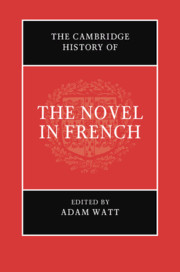Book contents
- The Cambridge History of the Novel in French
- The Cambridge History of the Novel in French
- Copyright page
- Contents
- Figures
- Contributors
- Acknowledgements
- Note on Conventions
- Chronology
- Introduction
- Part I Beginnings: From the Late Medieval to Madame de Lafayette
- Part II The Eighteenth Century: Learning, Letters, Libertinage
- Part III After the Revolution: The Novel in the Long Nineteenth Century
- 14 Post-Revolutionary Novels
- 15 Private Pain and the Public Temper: The Personal Novel and Beyond
- 16 Between Romance and Social Critique: Staël and Women Writers of the Early Nineteenth Century
- 17 French Realism and History
- 18 Law and the Nineteenth-Century Novel
- 19 Colonial Encounters in the Nineteenth-Century Novel
- 20 French-Canadian Novels from the Nineteenth into the Twentieth Century
- 21 Gender and the Novel from Sand to Colette
- Part IV From Naturalism to the Nouveau Roman
- Part V Fictions of the Fifth Republic: From de Gaulle to the Internet Age
- Index
- References
19 - Colonial Encounters in the Nineteenth-Century Novel
from Part III - After the Revolution: The Novel in the Long Nineteenth Century
Published online by Cambridge University Press: 04 February 2021
- The Cambridge History of the Novel in French
- The Cambridge History of the Novel in French
- Copyright page
- Contents
- Figures
- Contributors
- Acknowledgements
- Note on Conventions
- Chronology
- Introduction
- Part I Beginnings: From the Late Medieval to Madame de Lafayette
- Part II The Eighteenth Century: Learning, Letters, Libertinage
- Part III After the Revolution: The Novel in the Long Nineteenth Century
- 14 Post-Revolutionary Novels
- 15 Private Pain and the Public Temper: The Personal Novel and Beyond
- 16 Between Romance and Social Critique: Staël and Women Writers of the Early Nineteenth Century
- 17 French Realism and History
- 18 Law and the Nineteenth-Century Novel
- 19 Colonial Encounters in the Nineteenth-Century Novel
- 20 French-Canadian Novels from the Nineteenth into the Twentieth Century
- 21 Gender and the Novel from Sand to Colette
- Part IV From Naturalism to the Nouveau Roman
- Part V Fictions of the Fifth Republic: From de Gaulle to the Internet Age
- Index
- References
Summary
From Bernardin de Saint-Pierre’s Paul et Virginie (1788) to colonial literature at the end of the ‘long’ nineteenth century, the French novel is marked by the experience of colonialism. It responds to anxieties about individual and national identity as well as about its own generic proximity to scientific narratives, oriental tales and travel writing. Many nineteenth-century novels use colonial love plots in which the – almost always doomed – relationships are situated along an axis stretching from incest, real or symbolic, at one extreme, to racial mixing or miscegenation at the other. The first half of the century also sees novels dealing with political themes in the form of slavery, revolution, or inter-colonial rivalry. In the later decades of the century the novel responds to the rise of scientific racialism and, after 1870, to national anxieties about decadence and the birth rate: colonialism is generally held up as a source of renewal and national re-energisation, though some writers reflect anxiety about cultural and racial mixing in the colonies. French colonial literature seeks to justify itself in theoretical writing, hampered by a sense of inauthenticity compared to its British imperial rival, and frequently tempted towards ironic self-deprecation or doubt.
- Type
- Chapter
- Information
- The Cambridge History of the Novel in French , pp. 344 - 361Publisher: Cambridge University PressPrint publication year: 2021

